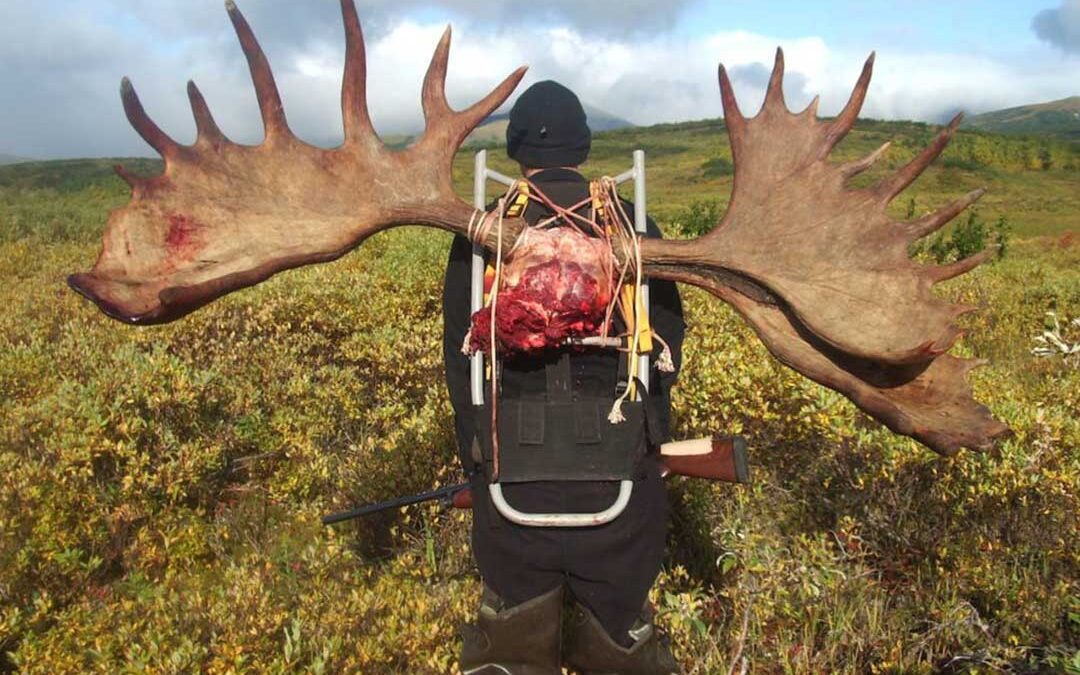During my early years of guiding, trial and error where often my best teachers.
Fortunately, most of my early clients were keen hunters and great sports who frequently mistook my youthful enthusiasm for experience.
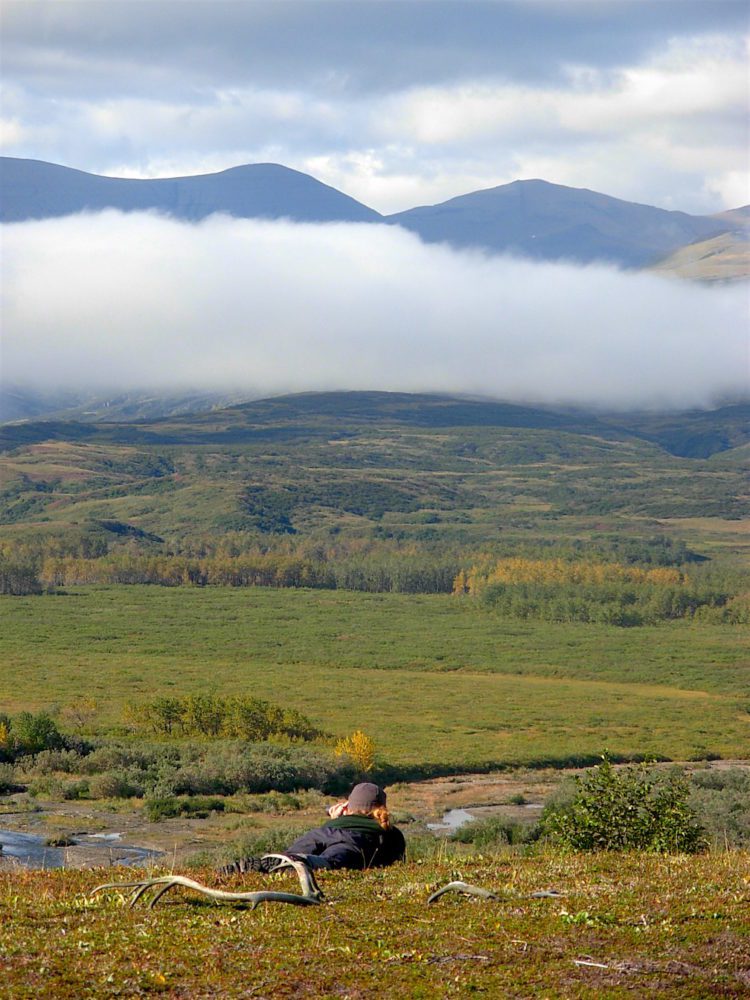
Glassing on a sunny day is pleasant. We didn’t get many sunny days on this moose hunt.
There was plenty of enthusiasm and learning on this moose hunt. We were putting on some serious miles chasing nearly every moose we saw. I considered each stalk a lesson. In my early 20s I didn’t even know what sore muscles were. To his credit my client never uttered a complaint. No matter how many miles of bogs and alder thickets we slogged through, he always wore a smile.
That particular morning, rain poured over us. Each time we lifted our binoculars, rivulets of water ran down our sleeves and wicked to our armpits. It was coming down in sheets when we saw two bulls across the river. I felt no hesitation whether we should go after them but was raised with enough sense to know the river could rage with a downpour of this magnitude. I figured the three of us (me, our six-foot packer and the client) could safely cross a river if we linked arms. I wasn’t sure how we would safely cross back. Not if the river continued to rise. Getting wet wasn’t the issue… before the wonders of Simms Gore-Tex rain jackets and waders, we all wore hip boots and cotton pants. Being wet and cold during hunting season was something everyone expected.
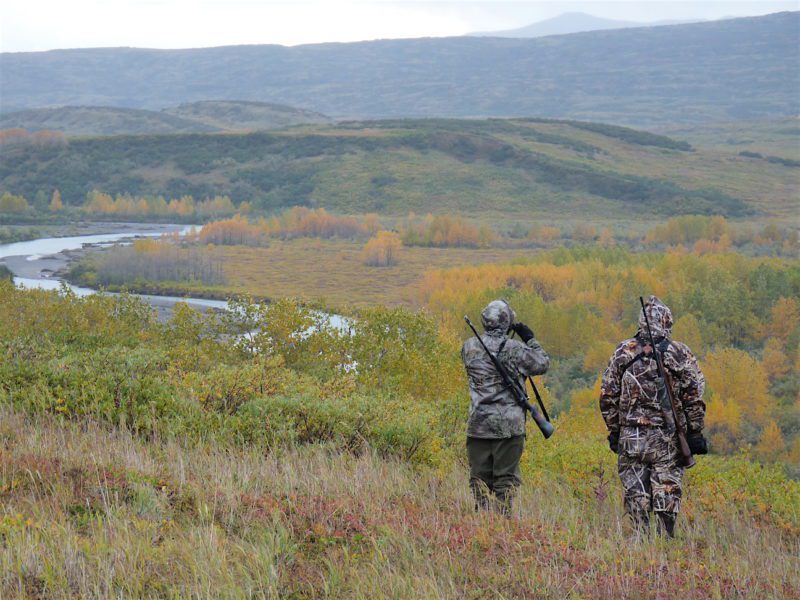
Even on rainy days you often spot moose farther away than it is wise to chase them.
The river pulsed with current and debris. The muddy waters swept to our armpits and thoroughly soaked us. Upon reaching the other side we dumped out our hip boots, wrung our jackets and began a stalk. Two miles later, after busting through alders and willows, we were 150 yards from the bulls. Closer inspection proved to us neither was the bull we were after. Being in no hurry to cross the river again, I suggested spending the remainder of the afternoon glassing the side we were on.
It was late afternoon when we saw another bull. He was well over 60 inches, at the base of a mountain and on our side of the river. I knew shooting a moose miles from camp was probably a bad idea, but I was young, idealistic, full of energy — and had a packer. But I also had respect for that rising river and didn’t relish re-crossing it at night. A safer option would be the tiny out-cabin and airstrip my family owned a number of miles away. And it was on the same side of the river as us. With this option in mind, we turned our backs on our cozy tent across the river and headed for the big bull.
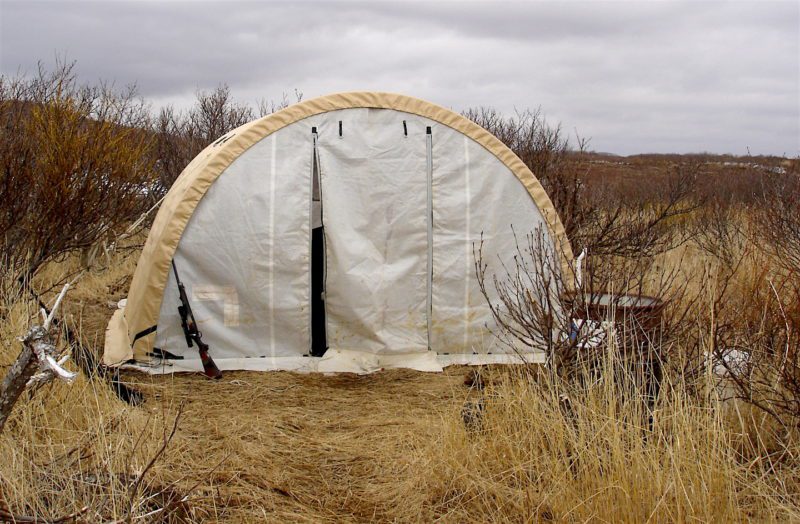
This is the WeatherPort tent we turned our backs on in order to reach our moose. Dripping, gray skies were daily companions on this moose hunt. Hey, it’s Alaska moose country.
Eight cows surrounded him. September bulls are rutty and unobservant while cows are wary all the time. With their ten-inch ears swiveling and 16 eyes scanning the brush, we dropped to our hands and knees and began to inch our way towards the bull. Soon we were on our bellies, crawling at a snail’s pace. It worked. We reached cover behind alders just 70 yards from the bull. It was all up to the hunter now.
When the first shot rang out the cows bolted, then stopped to look back. Time slowed as I watched the bull lock his knees, a sign of a solid hit. But moose are large creatures and it takes a while for them to go down. As long as they are still standing, it is best to keep shooting. A few more rounds and he toppled.
My hunter was ecstatic. This was a spectacular bull and he had worked for it. But daylight wasn’t on our side so there was little time for celebration. I slid a blade down the belly and steaming entrails poured out. It was almost dark by the time I stood up again. The rain was increasing, the cabin was miles away and we needed to hurry. I adjusted my pack straps to head towards the cabin while, unnoticed, my headlamp slipped from my pack unseen and fell into a pile of moose organs.
The wind increased to a rage as we stumbled along the creek bed. We leaned into it. Soon it was turning the rain from a simple downpour to a horizontal hurricane-force storm. Not exactly the best night to be searching for camp.
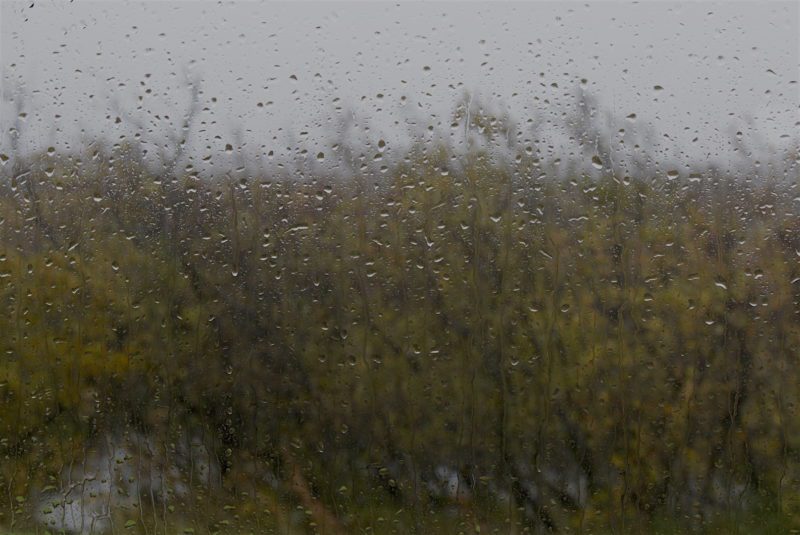
A gloomy, stormy, rainy day in Alaska is bad enough when see through a cabin window. It’s much worse when you’re facing a long hike in the dark with no flashlight. Not every AK moose hunt is so grim, but you have to be prepared for the worst.
“If we follow this valley out we will eventually reach the cabin,” I shouted, reassuring myself and the still smiling but physically drained hunter. “I’ve done this route plenty of times.” I failed to mention none of those times were in the dark with a 60 mph rain in my face. And just then I discovered the loss of my headlamp. My guiding skills and knowledge of the area were about to be put to a serious test!
Hour after hour we trudged. We fell into pot holes, tripped over tussocks and flailed through alders. When we hit a huge alder thicket and heard the murmur of a major river, I knew we were headed in the right direction, but we were also about to hit a virtual bear highway — with fresh moose blood on our clothes and the wind in our faces. The smell of rotting fish and musky bear drove us away from the river into a new and potentially confusing route.
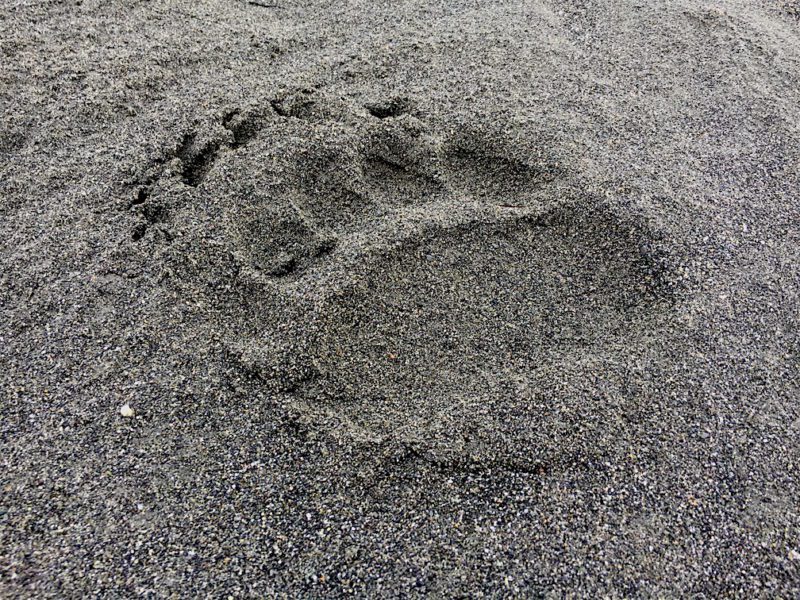
On a dark and stormy night, you don’t want to meet the bear that left this track.
By 2 a.m. we were climbing yet another hill when the client stated, “If we EVER reach the top of this hill, I’m done.” Feeling the physical exertion myself, I didn’t begrudge him this remark. Atop the hill we hunkered behind a clump of three-foot willows. It was scant shelter and did little to keep the wind from ripping at our saturated clothes. We picked at a few soggy sardines and nestled into the tundra for a couple hours of sleep.
When enough light seeped through the gray sky, illuminating our waterlogged world, the packer stood up and said “Tia, you think you might know where we are?” I jumped up and realized I did. We were on the hill just off the end of the runway! The warm, dry cabin sat at the other end of the airstrip just 300 yards away.
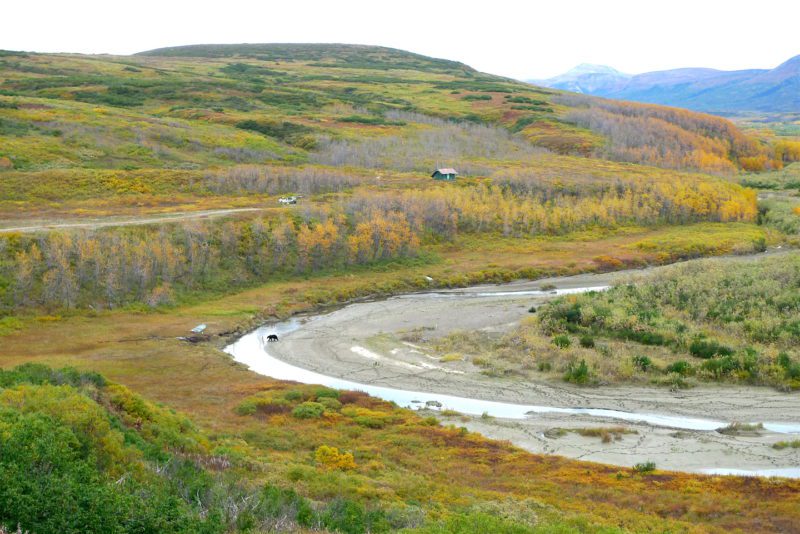
After our miserable night lost in the blowing rain, we woke at dawn to see our cabin just 300 yards away! Glad we didn’t stumble onto that bear in the dark.
After a hot meal we were all laughing about our nocturnal moose hunt adventure. It took two days of packing to get the meat and trophy out, but no one was complaining. More than a decade later I continue to correspond with this hunter and he never fails to talk about what a great adventure we had!
Looking back on my early years of guiding I cringe to think of some of the decisions I made. But I’ve learned from each experience. I’ve learned it is better to have a good spotting scope and judge animals at a distance because it saves miles of walking. I’ve learned when it’s safe to cross a river and when to just turn around and glass the other way. I’ve learned the value of waders and fleece and just how hard one should push a client. I’ve learned about navigation devices and hypothermia. I’ve learned I am not invincible. And that’s okay. Every one of these learning experiences has made me a better guide and outdoorswoman.
I also look back with relief on some of the good, snap decisions I made because they saved my life. Because what does a snap decision look like when a bear is in full charge and your gun jams? To find out, check out my post next month on Ronspomeroutdoors.com.
Registered Alaska Guide Tia Shoemaker recently finished seasonal maintenance on her bush plane. We think she’s preparing for another busy summer and fall leading sportsmen and women to the fantastic fish and game lurking in the wilds of The Last Great Place. You can read another short story about a moose mistake right here.

